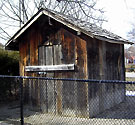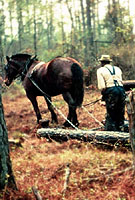| ONE MAN'S ANSWERS TO PRAYER by Arthur C. Custance |  |
||||||
| Introduction | Chapter 1 | Chapter 2 | Chapter 3 | Conclusion | |||
 "One Man's Answers to Prayer" is paper 7 in
"One Man's Answers to Prayer" is paper 7 inThe Flood: Local or Global |
WHOSE PRAYERS ARE ANSWERED?
We have in the New Testament only one recorded request by the disciples that the Lord teach them to do something, and that was how to pray. This is surprising in a way, because prayer seems such a natural thing to people who are neither proud nor irreligious, and the disciples seem to have been humble men in their way; and they were almost certainly members of some local synagogue where prayer was regularly made both in public and in private. Some of them at least had praying parents. Yet they seemed to have realized, being daily in the Lord's company, that their own prayers were somehow powerless, ill-conceived, misdirected (Luke 9:54!), and probably peculiarly impersonal in tone. One day, after watching Jesus at prayer, they seemed to have caught a glimpse of an entirely new kind of communion with God and they asked Him to teach them how to pray (Luke 11:1). |
|||
|
Prayer is the child of God's privilege and I believe it gives great pleasure to our Father in heaven. Not to pray is to defraud ourselves and to surrender in time the ability to wield one of the mightiest weapons in the Christian's armory. Some people argue that we don't need to pray, since God knows our situation perfectly and, being what He is, will supply all our needs (Philippians. 4:19). Indeed, if He has promised to answer before we call (Isaiah 65:24), why do we need to call at all? Why indeed? And yet, the worst of all diseases of the soul is detachment from God, whether by ignorance or by neglect. If all our wants were to be supplied while we had no thought of God, this could only confirm us in our detachment; so what might otherwise be supposedly a state of blessed assurance drifts easily into a condition of total indifference and becomes occasion for spiritual decline. By contrast, one might then suppose that God would always encourage our prayers by answering us at once. But we know He does not. And we learn by experience that while some fall by the way in discouragement, scarcely anything deepens and purifies a vital faith as surely as perseverance in prayer, despite long disappointment. So I should like to share a few of the things I have personally discovered about praying: who can pray, when one should pray, what to pray about, the form of one's prayers, why prayer is unanswered sometimes, and even where prayer is best offered -- whether in public or in private. I am not suggesting that my answers to some questions will satisfy those whose temperament is different; but they might serve perhaps to explain why some of us form certain habits as the result of experience which seem to others either not helpful or even a hindrance. It might help our fellowship together in the Lord to understand a little more clearly why there are differences between us in our practices. To begin with, we may consider briefly whether effectual prayer is necessarily limited to the child of God: and if not so limited, what advantage there is for the Christian in this regard. |
||||
 Ann Preston's prayer shed and capped well reproduced at Annswell Park, Dudley St, Thornill, Ontario
Ann Preston's prayer shed and capped well reproduced at Annswell Park, Dudley St, Thornill, OntarioDuring a particularly hot dry summer the well of 'Holy Ann' Preston's employer Dr Reid remained dry for two or three months and water had to be hauled in barrels from a distant well. Ann was taunted one evening to "Ask Father to send water in that well and not have us boys work so hard." Ann spent the night in fervent prayer lest "the boys won't believe I am what I profess to be." The next morning Ann hooked a pail to the windlass, lowered it with a splash and retrieved two buckets of clear, sparkling water. Her prayers had been answered. Dr Reid built Ann Preston a prayer shed in her declining years |
The Prayers of the Non-Christian Many years ago a friend and I found ourselves working on neighbouring farms as hired men. We were both what might be called "healthy pagans," but I also think we were both what could be described as reverent in our attitude toward God. Among the books my friend found at his farmhouse, one told the wonderful story of an Irish woman who was totally illiterate and yet had marvellous answers to her prayers. The woman's name was Ann Preston, and the book was called The Life Story of an Irish Saint. If I remember rightly, she had come over from Ireland somewhere about the turn of the century and was employed as a servant in a well-to-do household north of Toronto. Her answers to prayer were truly extraordinary, and only in very recent years did the book go out of print. My friend, Ted, read this book and was deeply moved. He brought it to me to read, which I did. I was equally stirred by it. We both agreed to see whether we too could get such answers to prayer. My recollection is that Ted did not experience the kind of answers which I did, though in due course he became a far more mature Christian. But this was sometime later. When I subsequently found myself in the company of young Christians of my own age in the University of Toronto within the framework of an organization then known as TICCU (Toronto Intercollegiate Christian Union), which is now known as IVCF (InterVarsity Christian Fellowship), no one doubted at first that I knew the Lord because I was still experiencing such specific and constant answers to my prayers. But I knew that these people had had an experience which I did not have, for I had no sense of sonship. I did not think of God as my Father, I lacked assurance of salvation entirely, and the Word of God was almost a closed book to my understanding. All this changed, of course, when the Lord broke through my darkness and revealed Himself to me as my Saviour. The nearness and reality of His presence in those first weeks was something I shall never forget. It was all so new. And thereafter whenever I prayed, I felt as though my Father in heaven leaned forward personally to attend to my concerns. |
|||
|
Now, I have recorded this because I want to underscore the fact that an individual may indeed experience concrete answers to his prayers even though he has no sense of the Lord's presence and knows God only as He who answers prayer. It is perhaps the only requisite for such an experience that the non-Christian believe that God hears and answers (Hebrews 11:6). Let me give one or two illustrations from that early record, dating around 1931.  One winter day I was skidding logs, that is, driving a horse dragging the log from where the tree had been felled up to the saw itself. I had a beautiful little mare whom I knew well and had a real affection for. Queenie was willing and fast. Through my carelessness I allowed her, pulling for all she was worth and at some speed through the underbrush, to run the end of the log she was dragging against a tree-stump almost buried in the snow. The log stopped instantly and, unfortunately for her, the trace did not break. The sudden shock was too much for her chest muscles, and she tore them so badly that the vet subsequently said she would never recover.
One winter day I was skidding logs, that is, driving a horse dragging the log from where the tree had been felled up to the saw itself. I had a beautiful little mare whom I knew well and had a real affection for. Queenie was willing and fast. Through my carelessness I allowed her, pulling for all she was worth and at some speed through the underbrush, to run the end of the log she was dragging against a tree-stump almost buried in the snow. The log stopped instantly and, unfortunately for her, the trace did not break. The sudden shock was too much for her chest muscles, and she tore them so badly that the vet subsequently said she would never recover.
Needless to say, I felt broken-hearted, for it really was my fault; and needless to say, the boss was more than a little displeased. We managed to get Queenie back to the stable and into her stall. The vet said, "If she ever lies down, she'll never get up. The best thing really is to shoot her." I asked the boss if he would leave her for one day. I wanted to pray about it -- though I didn't tell him so. After quitting time that evening, I went down to the stable and put my hand on her breast and asked God if He could heal her. Queenie was motionless, being reluctant to move at all because of the injury to her front legs. In the morning I went down before breakfast to see whether she was still on her feet. She was not only on her feet, but actually eating hay. She moved over a little as I went in beside her, and though she hobbled she didn't seem to be in pain. Naturally I told the boss about it at breakfast, but I don't think he really believed anything had happened except that he was surprised she was still standing. Well, to make a long story short, three weeks later Queenie was hitched up to a cutter and took the boss's children to school. She was never again used for logging, but there was no evidence in the subsequent months that she had suffered the slightest permanent injury. A skeptic might say that perhaps the vet was mistaken. Perhaps he was. But I had a succession of answers to prayer like this that could not all have been the result of misinterpretation. I remember buying a bicycle and riding it back to the farm along a country road that at one point cut through a hilltop which was all sand. In the summer the road was all sand too, as loose as dry sand always is. I found it impossible to ride through that two-hundred-foot section. One day, as I came to it on the bicycle, I said to God, "You can keep me on the bicycle." And, taking my hands off the handlebars, I rode straight through it and almost experienced a sense of being supported on either side by what I then supposed must have been angels! Yet I not only prayed specifically upon occasion, but tried also to cover myself against contingencies. Among my other duties during the winter was responsibility for the watering and feeding, at an otherwise deserted homestead, of some ninety Poll Angus steers, the wildest "critters" imaginable. I used to pray that God would keep them together when I drove them down to a running stream to water them. I had to be particularly careful when the job was done to make sure that three barnyard gates were all securely closed once they were penned up again. One day as I rode away from the yard and was about 150 to 200 feet from the last gate, which I supposed I had closed behind me, I suddenly heard my name called very distinctly. I stopped for a moment, wondering who had called, and then went on again down the road, only to be called again. This time I turned the horse around and looked toward the barnyard some distance back up the road and saw, to my grief, that I had not properly closed the gate and that it had swung wide open. I quickly asked God to keep the cattle in until I could get back to it and galloped my horse as fast as he would go. The cattle simply stood around, looking at the open gate, but made no move to pass through it. I soon had it closed and all was well. But there was no one there who might have called my name. Yet had it not been called, the cattle might have been all over the countryside by next afternoon when I would have revisited them The record of those pre-Christian years is filled with such things, which demonstrate clearly that there is a real relationship between man and God as between creature and Creator, which can be exploited and is exploited in wonderful ways by those who do not yet know Him as Father nor the Lord as Saviour. It should be remembered of Cornelius that we are told specifically how his alms and his prayers both had "come up" before God and were acceptable (Acts 10:1-4), even though it can hardly be doubted he was not yet a saved man. In his book The Origins of Religion (p.137), Samuel Zwemer records prayers of non-Christians from around the world which are wonderful in their perceptiveness, in their humility, in their sense of unworthiness, and in their expression of faith: and there is little doubt that they owe nothing to Christian influence. Like a Delaware Indian before going to war: "Great Spirit above! Have pity on my children and on my wife. Let them not mourn for me.... Have pity on me and protect my life." Or this, from a Galla of East Africa: "To Thee, O God, we take our flight [in sleep]; do not take Thy flight and go away from us." And this, from a Kekchi of India: "Who is my father, who is my mother? Only Thou, O God, Thou seest me and guardest me on all my path in darkness and trouble. Thou, Lord of the valleys and the mountains." An Algonquin Indian, dedicating his dwelling place: "I am thankful, O Thou Great Spirit, that we have been spared to live until now to purify with cedar smoke this our house, because that has always been the rule in the ancient world since the beginning of creation." In the literature of antiquity, especially in the Cuneiform and hieroglyphics of the Middle East, there are many prayers which reveal a tremendous sense of dependence upon God and of unworthiness in His sight, often written by men in high positions. It seems to me that some of these prayers cannot possibly have gone unanswered, the very wording of them revealing -- as it often does -- a genuine sense of personal contact with God to whom they are addressed. So the question arises, "In what sense is the Christian's position different?" What did Jesus mean when He said (John 14:6), "No man cometh unto the Father but by Me"? Did these ancient people go to God through Jesus Christ? That men could pray in those days and end their prayers as we do today, with the words "for the Lord's sake," is borne out by the fact that Daniel did (Daniel 9:17): Now, therefore, O our God, hear the prayer of thy servant and his supplications, and cause Thy face to shine upon Thy sanctuary that is desolate, for the Lord's sake. While we have no record of any pagan suppliant addressing himself to God through such a Mediator, yet we do have many records from antiquity of genuine prayers directed to God in such a way that the suppliant clearly believed God is approachable. Certainly the prayers of Cornelius were heard, as we have noted. I suggest that the Lord was speaking much more precisely than we have normally assumed when He avoided saying that no man goes to God except through Him. Any man may approach God as a creature before his Creator, but only a child of God can go to Him as Father and he does so through the mediation of Jesus Christ. This was my experience exactly. I went to God as a creature to his Creator, and God in His goodness met me in the way. But I did not know Him as my Father until I came to know Jesus Christ as my Saviour. The point is a very important one, I believe. There are people who are religious, devout, having not the slightest doubt of the reality of God's existence and His accessibility to man, yet who do not know Him as Father and have no assurance whatever of salvation. Such people need conversion, as I needed conversion -- and as I knew I needed conversion once I had associated with some of the Lord's children. They were deceived a little bit by my devoutness and answers to prayer, but in my own heart I knew otherwise. It is easy to be misled. I also consider the issue important because we should never suppose for one moment that only Christians can expect answers to prayer, or that when men in public office sincerely engage in prayer they are merely pretending or fooling themselves or wasting their time. We should never discourage men from looking to God in faith for help in time of need: nor should we encourage them in the belief that such activities will compensate when their lives are assessed in the time of judgment. Let us next consider the exercise of prayer as a function of a normal healthy life for the child of God speaking to his Father in heaven. |
||||
|
<<<
Introduction
Next Chapter - What Can We Pray About?
>>>
Also see How Did Jesus Die? by Arthur C Custance Ph.D. |
